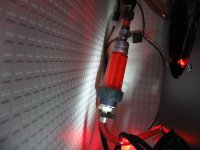I was under the impression that copper, brass and nickel plating are all fine because they’re similar enough that corrosion is imperceptibly slow. Whereas aluminium is dangerous.
They are "safer" than aluminium, but that's like saying that being shocked by 230v domestic mains voltage is better than being shocked by 440v industrial mains voltage, it is
true but ideally you don't wanna get shocked by either.
As a point of note, copper and aluminium are ~ just as dissimilar as nickel and tin, but water cooling forums aren't awash with warnings not to use nickel blocks because they will react with the tin solder holding the radiator together, because it's not an issue as pretty much everybody these days uses proper coolant.
What I find odd is that EKWB seems to agree, they specifically state that you cannot use their aluminium ‘gaming’ line with their other products.
You have to remember that EKWB are a company and when dealing with customers have to account for the lowest common denominator, it's the same reason that McDonalds put "Danger, contents may be hot" warnings on their hot apple pies and fresh coffee

If you use an EK aluminium CPU block with an EK copper GPU block and just distilled/deionised water you'll experience the full might of corrosion, if you use decent coolant you will be fine for years.





